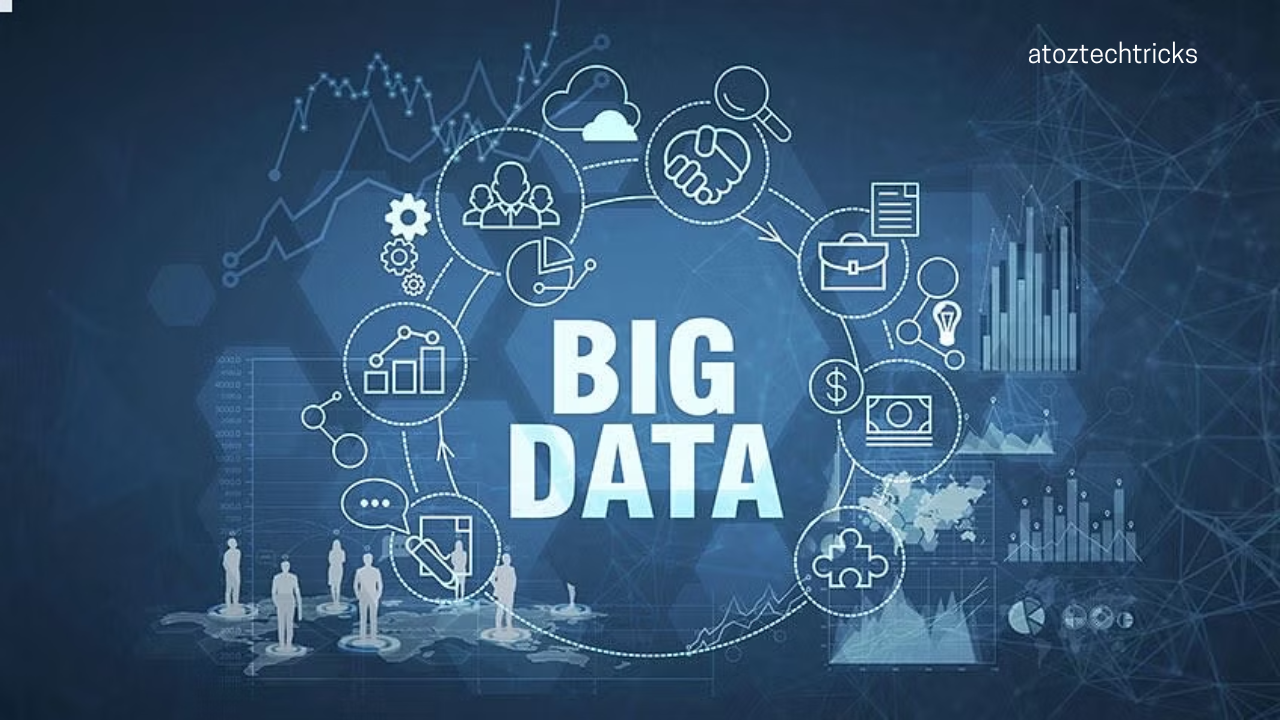In today’s rapidly evolving business landscape, data has become an invaluable asset. The advent of Big Data has transformed how organizations operate, make decisions, and gain competitive advantages. Big Data refers to the vast volume of structured and unstructured data generated by businesses, consumers, and devices every second. This data, when properly harnessed, can provide deep insights, enabling businesses to make more informed and strategic decisions. This article explores the impact of Big Data on business decision-making, its benefits, challenges, and future trends.
Understanding Big Data
Big Data is characterized by the three Vs: Volume, Variety, and Velocity.
- Volume refers to the sheer amount of data generated every day. From social media interactions to transaction records, the volume of data is unprecedented.
- Variety encompasses the different types of data, including structured data (like databases), semi-structured data (like XML files), and unstructured data (like videos, social media posts, and emails).
- Velocity is the speed at which data is generated and processed, which has accelerated significantly with the advent of real-time data processing technologies.
Another aspect often included is Veracity, which refers to the quality and reliability of the data. Inaccurate or biased data can lead to poor decision-making, making it crucial for businesses to ensure data accuracy.

The Role of Big Data in Business Decision Making
Big Data plays a pivotal role in business decision-making by providing actionable insights that were previously unattainable. Here are some key ways in which Big Data influences decision-making:
1. Enhanced Customer Understanding
One of the most significant impacts of Big Data is the ability to gain a deeper understanding of customers. Businesses can analyze customer data from various sources, such as social media, purchase history, and online behaviour, to create detailed customer profiles. This understanding allows companies to personalize their products, services, and marketing strategies to better meet customer needs and preferences.
For example, Amazon uses Big Data to recommend products to its customers based on their browsing and purchase history. This personalized approach not only enhances the customer experience but also increases sales and customer loyalty.
2. Improved Operational Efficiency
Big Data enables businesses to optimize their operations by identifying inefficiencies and areas for improvement. By analyzing data from various operational processes, companies can streamline workflows, reduce costs, and improve productivity.
For instance, manufacturing companies can use data from sensors and machinery to predict equipment failures before they occur, enabling preventative maintenance and reducing downtime. Similarly, logistics companies can optimize delivery routes based on real-time traffic data, reducing fuel consumption and delivery times.
3. Data-Driven Marketing Strategies
Marketing has been revolutionized by Big Data. Businesses can now create highly targeted marketing campaigns based on detailed customer insights. By analyzing data on customer demographics, preferences, and behaviour, companies can segment their audience and deliver personalized messages that resonate with each segment.
For example, Netflix uses Big Data to recommend shows and movies to its users based on their viewing history. This personalized approach has been key to Netflix’s success, keeping users engaged and subscribed to the platform.
4. Risk Management and Fraud Detection
Big Data plays a crucial role in risk management and fraud detection. By analyzing patterns and anomalies in data, businesses can identify potential risks and take proactive measures to mitigate them. This is particularly important in the financial industry, where fraud detection is a top priority.
Banks and financial institutions use Big Data analytics to monitor transactions in real-time and identify suspicious activities that could indicate fraud. This allows them to prevent fraud before it occurs, saving millions of dollars in potential losses.
5. Innovation and Product Development
Big Data is a catalyst for innovation and product development. By analyzing market trends, customer feedback, and competitive intelligence, businesses can identify opportunities for new products and services. This data-driven approach to innovation reduces the risk of failure and increases the likelihood of success.
For example, Procter & Gamble uses Big Data to drive innovation in product development. By analyzing customer feedback and market trends, the company can identify unmet needs and develop products that meet those needs.
Understanding the Basics of Machine Learning and Its Applications
Benefits of Big Data in Business Decision-Making
The integration of Big Data into business decision-making processes offers numerous benefits:
1. Informed Decision Making
One of the most significant advantages of Big Data is the ability to make informed decisions. With access to vast amounts of data, businesses can analyze trends, patterns, and correlations that would be impossible to detect with traditional data analysis methods. This leads to more accurate and reliable decisions.
For example, retailers can use Big Data to analyze customer purchasing patterns and predict future trends. This allows them to make informed decisions about inventory management, pricing strategies, and marketing campaigns.
2. Competitive Advantage
Big Data provides businesses with a competitive advantage by enabling them to respond quickly to market changes and customer demands. Companies that can analyze and act on data faster than their competitors are better positioned to capture market share and achieve long-term success.
For instance, ride-sharing companies like Uber and Lyft use Big Data to optimize their services in real-time. By analyzing data on driver availability, customer demand, and traffic conditions, they can adjust pricing and dispatch drivers more efficiently, providing a better service than traditional taxi companies.
3. Cost Reduction
Big Data can lead to significant cost savings by identifying inefficiencies and optimizing resource allocation. By analyzing data from various business processes, companies can identify areas where costs can be reduced without compromising quality or performance.
For example, energy companies use Big Data to optimize energy production and distribution. By analyzing data on energy consumption patterns, weather conditions, and equipment performance, they can reduce energy waste and lower operational costs.
4. Increased Customer Satisfaction
Big Data allows businesses to deliver a more personalized and satisfying customer experience. By understanding customer preferences and behaviour, companies can tailor their products, services, and interactions to meet individual needs. This leads to increased customer satisfaction, loyalty, and retention.
For instance, airlines use Big Data to improve the customer experience by analyzing data on flight delays, passenger preferences, and feedback. This allows them to make adjustments to improve service quality and ensure a smoother travel experience.
5. Enhanced Agility and Flexibility
In today’s fast-paced business environment, agility and flexibility are critical to success. Big Data enables businesses to be more agile by providing real-time insights that allow for quick decision-making. Companies can respond to changes in the market, customer preferences, and competitive landscape more swiftly, ensuring they stay ahead of the curve.
For example, e-commerce platforms can use Big Data to quickly adapt to changes in consumer behaviour. If a particular product suddenly becomes popular, the platform can adjust its inventory and marketing strategies in real-time to capitalize on the trend.

Challenges of Big Data in Business Decision-Making
Despite its many benefits, the use of Big Data in business decision-making also presents several challenges:
1. Data Privacy and Security
One of the biggest challenges associated with Big Data is ensuring data privacy and security. As businesses collect and store vast amounts of data, they become more vulnerable to cyberattacks and data breaches. Protecting sensitive customer information and complying with data privacy regulations is a top priority for businesses.
For example, the introduction of the General Data Protection Regulation (GDPR) in Europe has imposed strict requirements on how companies collect, store, and use personal data. Non-compliance can result in hefty fines and damage to a company’s reputation.
2. Data Quality and Accuracy
The accuracy and reliability of data are crucial for effective decision-making. However, with the vast amount of data being generated, ensuring data quality can be challenging. Inaccurate, incomplete, or outdated data can lead to poor decisions and negative outcomes.
Businesses must implement robust data governance practices to ensure data accuracy and reliability. This includes regular data cleaning, validation, and updating to maintain high-quality data.
3. Complexity and Integration
The complexity of Big Data and the integration of different data sources can be overwhelming for businesses. Combining data from various sources, formats, and systems requires advanced technologies and skilled professionals. Ensuring that data is properly integrated and analyzed is essential for deriving meaningful insights.
For example, a multinational corporation may have data stored in different formats and systems across various regions. Integrating this data into a cohesive and analyzable format requires sophisticated data management tools and expertise.
4. Talent Shortage
The demand for skilled data scientists and analysts has surged with the rise of Big Data. However, there is a shortage of professionals with the necessary skills to analyze and interpret Big Data effectively. This talent gap can hinder a company’s ability to leverage Big Data for decision-making.
To address this challenge, businesses may need to invest in training and development programs to upskill their existing workforce or seek partnerships with external data analytics firms.
5. High Costs and Resource Requirements
Implementing Big Data solutions can be costly and resource-intensive. The infrastructure, technology, and talent required to collect, store, process, and analyze Big Data can be significant investments. Small and medium-sized enterprises (SMEs) may find it challenging to allocate the necessary resources to fully leverage Big Data.
However, the rise of cloud-based Big Data solutions and services has made it more accessible and affordable for businesses of all sizes to implement Big Data strategies.
Future Trends in Big Data and Business Decision-Making
As technology continues to advance, the impact of Big Data on business decision-making is expected to grow even further. Here are some future trends to watch:
1. Artificial Intelligence and Machine Learning Integration
The integration of Artificial Intelligence (AI) and Machine Learning (ML) with Big Data is set to revolutionize business decision-making. AI and ML algorithms can process vast amounts of data at unprecedented speeds, uncovering patterns and insights that were previously hidden. These technologies enable businesses to make more accurate predictions and automate decision-making processes.
For example, AI-powered chatbots can analyze customer interactions in real-time to provide personalized recommendations and support. This not only enhances the customer experience but also improves operational efficiency.
2. Real-Time Analytics
The demand for real-time analytics is increasing as businesses seek to make faster and more informed decisions. Real-time analytics allows companies to process and analyze data as it is generated, providing immediate insights that can be acted upon quickly.
For instance, financial institutions can use real-time analytics to monitor market trends and make instant trading decisions. This agility is crucial in fast-paced industries where timing is critical.
3. Data Democratization
Data democratization refers to making data accessible to a broader range of employees within an organization. Traditionally, data analysis was limited to data scientists and analysts. However, with the rise of self-service analytics tools, employees across different departments can now access and analyze data independently.
This trend empowers employees to make data-driven decisions without relying on specialized teams, fostering a culture of data-driven decision-making across the organization.
4. Increased Focus on Data Privacy and Ethics
As the use of Big Data becomes more pervasive, there will be a heightened focus on data privacy and ethics. Businesses will need to adopt stricter data privacy practices and ensure that their use of data aligns with ethical standards. This includes being transparent about data collection and usage and obtaining informed consent from customers.
The rise of ethical AI and responsible data usage will be key trends in the coming years as businesses seek to build trust with customers and stakeholders.
5. Expansion of Big Data Applications
The applications of Big Data are expanding beyond traditional industries such as finance and retail. Sectors like healthcare, agriculture, and education are increasingly leveraging Big Data to drive innovation and improve decision-making.
For example, in healthcare, Big Data is being used to develop personalized treatment plans, predict disease outbreaks, and improve patient outcomes. In agriculture, farmers are using Big Data to optimize crop yields, reduce waste, and enhance sustainability.
Big Data has fundamentally transformed the way businesses make decisions. By providing deep insights into customer behaviour, market trends, and operational efficiency, Big Data enables companies to make more informed, strategic, and timely decisions. While there are challenges associated with Big Data, such as data privacy, complexity, and resource requirements, the benefits far outweigh the drawbacks.
As technology continues to evolve, the role of Big Data in business decision-making will only become more significant. Businesses that embrace Big Data and invest in the necessary infrastructure, talent, and tools will be better positioned to thrive in the competitive and data-driven business landscape of the future.
The Evolution of Cloud Computing: What’s Next for the Cloud?




